For learning executives who have marshaled resources and applied innovative practices, processes and/or technologies in a new and groundbreaking way to address a significant business or organizational opportunity.
DIVISION 1

Damodar Padhi
Vice President and Global Head of Talent Development, Tata Consultancy Services
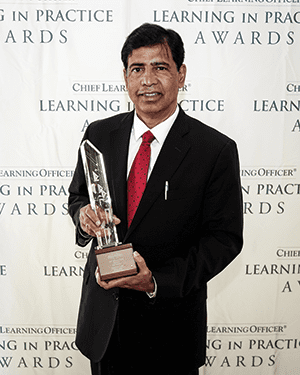
As global IT service leader Tata Consultancy Services continues to grow around the world, its leaders recognized that global scale highlights the importance of moving away from physical learning spaces to digital learning. Allowing for learning to happen anytime, anywhere and on any device makes it easier for everyone to learn. Damodar Padhi, vice president and global head of talent development, led a team of more than 600 talent development professionals in re-examining conventional learning process and creating a digital learning platform.
Padhi’s team built a content ecosystem with internal content research and development teams at the core, augmented by their global network of subject matter experts, third party content providers, national and international universities and alliance partners. In the transition, Padhi helped reimagine learning for a high-tech ecosystem, resulting in greater efficiency using videos, mobile learning, connected classrooms and virtual labs.
The results of the digital transition prove the value of the approach. Revenues crossed $17.5 billion and employee satisfaction has gone up across the board. Importantly, 90 percent of TCS’ 5.2 million total learning days now comes from scalable, efficient and effective digital learning.

Lynn Williams
Global Head of Leadership Development Programs, Sanofi
Sanofi, a pharmaceutical and life sciences company, was in need of a global leadership development program that could keep pace with the needs of the business and increase
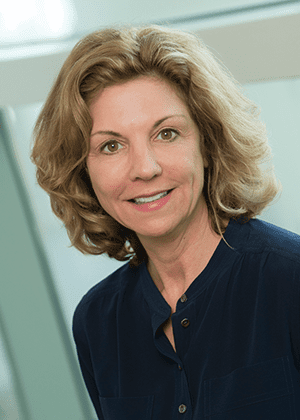
departmental reach and agility. Lynn Williams, global head of leadership development programs, led a team in a series of initiatives to provide resources throughout Sanofi to broaden skills, build networks and develop expertise to improve performance and further career development within the company.
Under the new programs, the team reinforced the One Sanofi strategy which increased talent mobility across the business and regions through unified programs. Among other accomplishments, the team created a consistent leadership language and common understanding around business imperatives through an organizationwide model for leadership, bolstered executive confidence through better aligned programs, decommissioned duplicative programs, eliminated extensive use of external vendors, lowered operating costs through technology and shifted its classroom instruction philosophy to a 70-20-10 model.

Mariam Kakkar
Chief Talent Development Unit, United Nations Development Programme
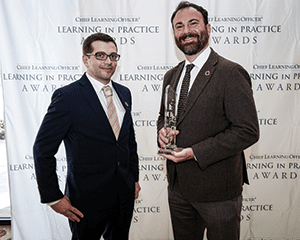
Mariam Kakkar, the chief of the talent development unit at United Nations Development
Programme, led the organization through the launch of three new leadership development pathways, all within a continuous learning framework. The pathways were based on a new U.N. Leadership model and were implemented across 170 countries worldwide.
DIVISION 2

Josh Gilliam
Director of Curriculum Design and Development, Suffolk Construction
Suffolk Construction, a national construction company headquartered in Boston, first planned for a full year to complete its operational role-based curriculum for training new employees.
But as the company doubled in size from 2007 to 2015 and expected revenue to grow to $4 billion by 2022, Suffolk’s leadership team asked to speed up the curriculum timeline to just six months.
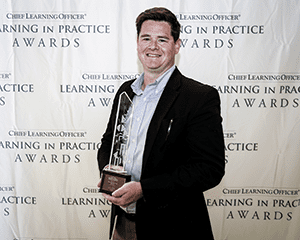
To meet the new demands, Josh Gilliam, director of curriculum design and development at Suffolk, led a team in designing and developing 45 courses. To do this, Gilliam’s team created a manufacturing model for course design and development. The team took the traditional ADDIE model and added three “lean” principles that were first developed in Toyota’s assembly plants. The three principles were: flow efficiency over resource efficiency, active visualization and continuous improvement.
The result of the new curriculum design led to many benefits for the organization. Suffolk is now able to use cost and time equations as benchmarks to advise internal clients on designing and developing learning content. They can also use the model to visualize the process and create buy-in for clients and stakeholders not familiar with the cycle of learning content creation. The model also quantifies financial savings which leads to faster course development. Overall, the operational process model helps prove how learning and development can leverage business processes and support the company.

Minette Chan
Director of Learning Solutions, Synaptics
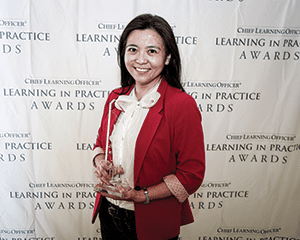
Technology company Synaptics is a major part of the PC, smartphone, tablet and automotive-electronics market. Its touch-enabled products are vital to today’s technological devices. The rapid pace of evolving technology, however, meant that often much of the knowledge at the company wasn’t documented, but rather only in the minds of the company’s experts.
This lack of a formal knowledge sharing program meant the company often had to solve the same problem multiple times. Minette Chan, director of learning solutions at Synaptics, set out to establish a program around preserving and sharing institutional knowledge across the company’s diverse professional users. The result, called SynaVision, is a searchable corporate YouTube channel that enables Synaptics to centralize knowledge and share it across departments. This saved time and money around knowledge management for employees over two continents and three business units. Just a few months after the launch, there were more than 600 videos on the SynaVision channel and thousands of hours of material watched by Synaptics employees around the globe.

Clay Kubicek
Education Director, Crossland Construction Co.
Clay Kubicek led the Crossland Academy team in building the Crossland Way Best Practice field training program, an on-the-job training and a competency rating system. The program helped establish consistent methods of construction across the organization and the ratings results allow for measurable goals for improvement.
Ave Rio is an associate editor at Chief Learning Officer magazine. She can be reached at editor@CLOmedia.com.














